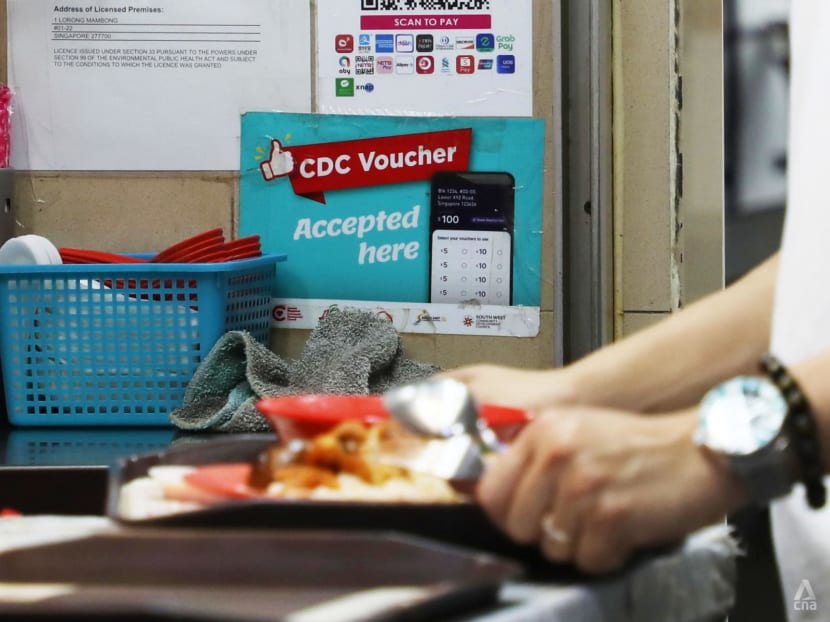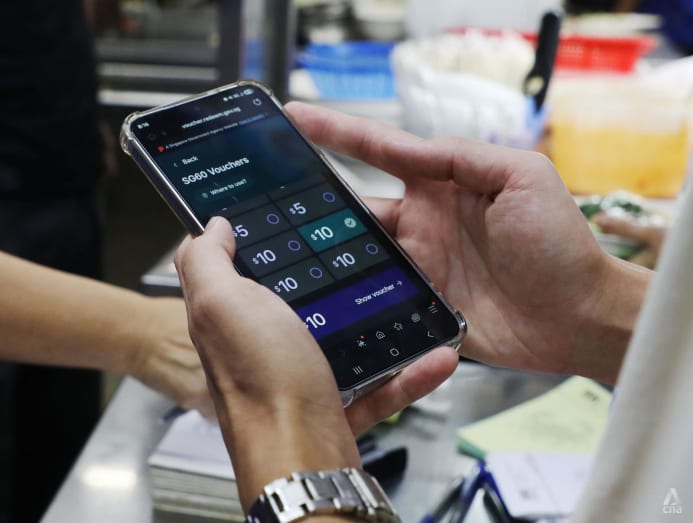My friend paid for dinner with CDC vouchers. Why does it feel weird to pay them back?
From zi char dinners to date nights, paying with CDC vouchers creates a new kind of social puzzle: how do you split the bill when there are no rules?

CDC vouchers were designed to ease daily costs, but in practice, they have reshaped how we value money, fairness, and friendships. (Photo: CNA/Alyssa Tan)

This audio is generated by an AI tool.
I'm a fan of vouchers. Like many Singaporeans, I welcomed the latest SG60 voucher drop as a timely buffer against rising costs – a small but tangible relief at the checkout counter.
What I hadn't anticipated was how they would usher in a new set of problems.
Cue dinner with friends, a simple zi char night. When the bill arrived, one friend waved us off, pulled out his phone, and triumphantly scanned his Community Development Council (CDC) vouchers at the counter.
We cheered. He beamed. The uncle nodded.
A rousing success – national policy, converted into sambal kangkong.
Then came the pause.
How do the rest of us pay him back? Cash? Vouchers? A round of drinks the next time?
What should have been a straightforward moment – "just PayNow me" suddenly became a small social dilemma.
WHEN S$10 DOESN'T FEEL LIKE S$10
Rolled out in 2020, the CDC vouchers were meant to ease rising costs. This year, every Singaporean household gets S$800 (US$623) in two tranches, redeemable at hawker centres, supermarkets, provision shops, even the odd clinic or salon. Special vouchers were also announced in July as part of a broader SG60 package, for all citizens aged 21 and above.
The idea is straightforward: lighten everyday expenses and channel spending back into heartland businesses.
On paper, that makes CDC vouchers as good as cash. In practice, though, we don't always treat them that way.
A S$10 voucher and a S$10 bank note are identical in value, but they occupy different spaces in our minds.
Some days, vouchers feel like bonus money. Want satay, kopi or a random impulse snack? Done. CDC to the rescue.
Other times, vouchers like these feel too precious to part with. "Better save these for NTUC," I tell myself, as if the difference between buying eggs with vouchers or cash will transform my household budget.
The SG60 vouchers feel even more precious as they're doled out to individuals rather than households. These aren't shared among my family members; they're "mine".
That tug-of-war is manageable when it's just me. But once someone else's vouchers enter the picture, dinner stops being just dinner.
Suddenly, I'm participating in an unspoken exchange-rate negotiation over what, exactly, those vouchers are worth.

FREE MONEY, OR JUST MONEY?
This is where things get tricky. Psychologically, many people see vouchers as "free money". You didn't earn them, so they feel easier to spend.
Recently, a TikTok user sparked public debate when she shared that she'd recently paid for a S$100 dinner date with CDC vouchers, only for her date to later call it "kinda embarrassing".
Embarrassing why? The bill was paid. The cashier accepted the woman's vouchers. She hadn't had to ask for concessions to use them.
But perhaps because CDC vouchers don't come directly out of one's pocket, the gesture can feel lighter – less like generosity, more like a perk.
To some, it's the social or emotional equivalent of regifting the "free towel" you got from a department store promotion. Perfectly functional, still worth something, but not quite the same as if you'd gone out and chosen something specifically for the recipient and paid for it with money from your wallet.
Among friends, the meaning flips again.
If someone pays for dinner with vouchers, reimbursing them in cash can feel like they've "lucked out", converting limited-use credits into universal money. At the same time, reimbursing them in vouchers can mean you risk coming off as stingy, as if you're unwilling to part with "real" cash.
Neither option feels entirely fair. And that discomfort reveals something bigger: when it comes to relationships – romantic or platonic – fairness often matters more than the maths.
We already notice the little imbalances with friends: who ordered the pricier dish, who always suggests more expensive dining spots, who consistently and conveniently "forgets" to PayNow until nudged.
Vouchers just add another layer to that quiet accounting. They force us to ask ourselves: do we see them as mere units of monetary value, or something less?
And often, it's that perception – not the amount itself – that determines whether a moment feels generous, awkward or quietly unfair.
MY LOW-STRESS APPROACH
I don't have the authority to invent national voucher etiquette. Nor do I think we need a formal set of rules to overcomplicate what was designed and intended to be a simple voucher system.
But after a few awkward meals, I've found a few things that make life (and zi char with friends) less complicated.
1. Acknowledge the value
The first step is simple: Don't treat vouchers as "lesser". They may feel like free money, but they pay for real food, groceries and bills. Honouring that value, instead of acting like it's Monopoly cash, goes a long way in keeping things fair.
2. Talk it out
Most of the tension comes from silence. These days, if vouchers are involved, I'll just say so: "I can use mine tonight," or "I'd rather save these for NTUC''.
Really, it's no different from saying, "I'll pay first", or "my treat tonight". The clarity saves everyone from weighing and decoding unspoken rules while the last courtesy piece of har cheong gai (or fried prawn paste chicken wing) goes cold.
3. Don't overthink
At the end of the day, maintaining a balance in any relationship is not about chasing perfect fairness down to the dollar.
Whether it's in vouchers or in cash, a few dollars won't make or break a friendship, but how we handle it might. Choosing to be more flexible, relaxed or perhaps even a little generous, usually matters more than getting the math exact.
Are these rules foolproof? Of course not. But they keep me from overthinking every PayNow transfer, and that's already half the battle won.
MORE THAN THE BILL
The truth is, CDC vouchers weren't meant to create these social dilemmas. They were designed to ease household costs.
But they have revealed something bigger: money, in whatever form, is never just about numbers. It's also about feelings, expectations and the unspoken contracts between us.
Change the medium of exchange, and those contracts shift too. The question isn't how do we stop that shift from taking place, but rather if we're willing to go with the flow.
Maybe the etiquette we need isn't about vouchers at all, but about respect.
Respect the value, respect the intent, respect the friendship. Assume your friend isn't tallying, your date isn't secretly judging, and that everyone just wants to enjoy the meal and the time spent together without turning it into a virtue-signalling competition.
At the end of the day, the real value isn't in the vouchers. It is in the people you share them with.
And if even that feels too complicated, maybe next time, I'll just suggest we eat somewhere my vouchers can't be used.
Problem solved. Or at least postponed until dessert.
Deborah Ng is an intern journalist with CNA TODAY.
If you have an experience to share or know someone who wishes to contribute to this series, write to voices [at] mediacorp.com.sg (voices[at]mediacorp[dot]com[dot]sg) with your full name, address and phone number.






.jpg?itok=naxyuiLN)







